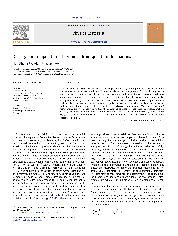摘要
A novel method to determine the density and temperature of a system is proposed based on quantum fluctuations typical of fermions in the limit where the reached temperature T is small compared to the Fermi energy epsilon(f) at a given density rho. Quadrupole and particle multiplicity fluctuations relations are derived in terms of T/epsilon(f). This method is valid for infinite and finite fermionic systems, in particular we apply it to heavy ion collisions using the Constrained Molecular Dynamics (CoMD) approach which includes the Fermi statistics. A preliminary comparison to available experimental data is discussed as well. We stress the differences with methods based on classical approximations. The derived 'quantum' temperatures are systematically lower than the corresponding 'classical' ones. With the proposed method we may get important informations on the Equation of State (ECG) of quantum Fermi systems to order O(T/epsilon(f))(3), in particular near the Liquid-Gas (LG) phase transition and at very low densities where quantum effects are dominant. 2010 Elsevier B.V.
- 出版日期2011-1-24
